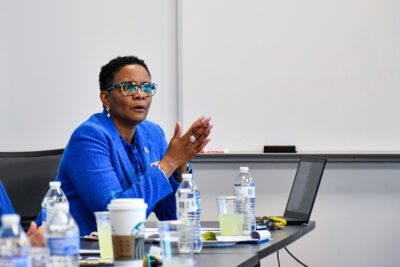

Two recent education news stories deserve more attention. Together, these items of “good news” elevate the imperative of increasing college-going in North Carolina.
Out of the state Department of Public Instruction came a report of significant gains by public school students in advanced placement exams last year. By taking the College Board AP courses and exams, high school students can boost their grade-point average and qualify for college credit.
More than 75,000 students took AP exams in North Carolina last year. The increased rate of its students scoring in the “proficient” range exceeded the national performance.
More Black and Hispanic students took AP exams than in the previous year. What’s more, the increase in “proficient” scores by Black and Hispanic students in North Carolina outpaced the national rate.
Meanwhile, at the mid-September meeting of the UNC Board of Governors, President Peter Hans recommended another year of no increase in undergraduate tuition at the 16 campuses in the system. Four universities have recently had tuition reduced to $500 a semester. For the rest of its campuses, the UNC system has held in-state tuition constant for seven years — and Hans says his goal is a full decade without an increase.
“Frustration about ever-rising college costs, which became so entrenched over the past two generations, has done real damage to the students we need to reach in order to fulfill our mission,” Hans said. “Poor and working-class families too often get the message that college is out of reach, that college debt is crushing, that degrees don’t pay off. We need to say loudly and clearly that in North Carolina, that simply isn’t true.”
The context that binds these North Carolina education developments is captured in an opinion column by Anne Case and Angus Deaton, economists at Princeton University. They describe “two Americas,” writing that “a clear line demarcating the division is educational attainment.”
As the Bureau of Labor Statistics regularly reports, people with education beyond high school typically earn more than those with a high school diploma — and university graduates out-earn people with associate degrees. Case and Deaton report with a tone of astonishment that Americans without a college degree have a life expectancy of eight and a half years less than college graduates.
To be sure, increasingly over two decades, North Carolina has delivered the message of the importance of education beyond high school in the 21st Century — even for young people not headed into a university. It has set as a goal 2 million North Carolinians ages 25-44 with job-qualifying credentials, associate degrees, and bachelor’s degrees by 2030. Gov. Roy Cooper has issued an executive order to open state government jobs, previously requiring a university degree, to people with appropriate skills.
The state’s efforts battle strong headwinds. Opinion surveys show a worrisome decline in public confidence in higher education, along with a decade-long drop in enrollment. While K-12 schools show signs of recovery from the pandemic, they are also afflicted with too-high chronic absenteeism.
North Carolina’s future remains dependent on its persistence, in policymaking and school practices, to propel its young people beyond the 12th grade — to define high school commencement as indeed a beginning, not an ending. The recent gains in AP exams should serve as encouragement to teachers and guidance counselors, as well as parents, to nudge students to enroll and succeed in more challenging courses as pathways to community colleges and universities.
Historically, North Carolina has been a low-tuition state. Even so, it shared with other Southern states a culture of low expectations, an ingrained attitude that a certain tier of people — including whites, Blacks, Hispanics, American Indians — will remain stuck at or near the bottom, that upward mobility is not their destiny.
Now a robust-growth mega-state, North Carolina has the ability to overcome that lingering low-expectations legacy.




